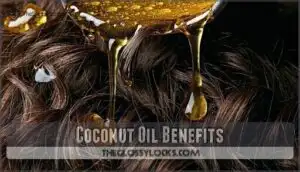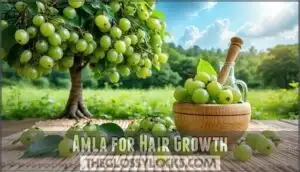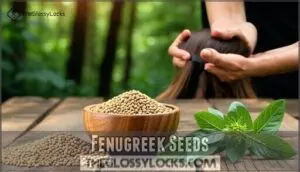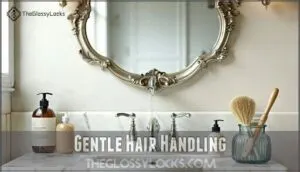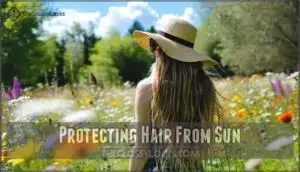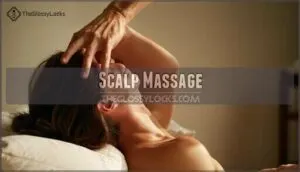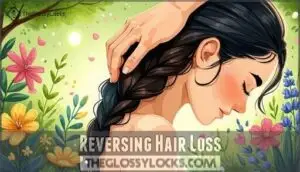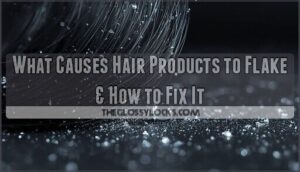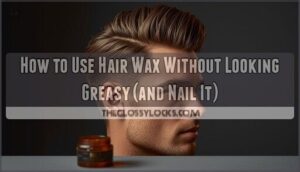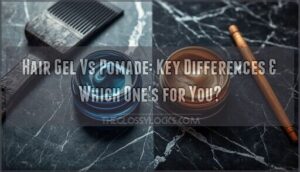This site is supported by our readers. We may earn a commission, at no cost to you, if you purchase through links.
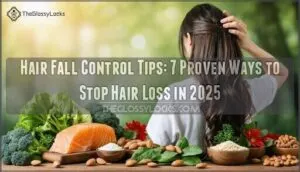
You’ll want to eat protein-rich foods, manage stress levels, and avoid tight hairstyles that pull at your roots.
Gentle handling makes a real difference – think of your hair like delicate silk that needs care, not rough treatment.
Essential nutrients like iron and vitamins A and C fuel healthy growth, while scalp massage boosts circulation.
Don’t overlook hydration either – dehydrated hair breaks easily.
Most importantly, consistency beats perfection every time, and it’s crucial to combine these fundamentals with targeted natural remedies that work specifically for your hair type.
The secret lies in combining these fundamentals with targeted natural remedies, focusing on healthy growth to achieve the best results.
Table Of Contents
- Key Takeaways
- Causes of Hair Fall
- Signs and Symptoms
- Natural Hair Remedies
- Dietary Changes for Hair
- Hair Care and Prevention
- Reversing Hair Loss
- Frequently Asked Questions (FAQs)
- How to stop hair fall?
- What should I do if my hair is falling out?
- Can home remedies reduce hair fall?
- How can I manage severe hair fall conditions?
- How to control hair fall in women with long hair?
- How to control hair fall & increase hair growth?
- Is hair loss permanent?
- Do hot showers cause hair loss?
- Does caffeine stop hair loss?
- Can stress cause hair loss?
- Conclusion
Key Takeaways
- Eat protein-rich foods and manage stress – You’ll strengthen your hair from within by consuming 40-60 grams of protein daily and practicing stress management techniques, like meditation, since chronic stress elevates cortisol levels that disrupt your hair’s growth cycle.
- Handle your hair gently and avoid damage – You should treat wet hair like delicate silk, use wide-tooth combs, limit heat styling to twice weekly, and avoid tight hairstyles that cause traction alopecia at your hairline.
- Try natural remedies consistently – You can massage coconut oil into your scalp, apply onion juice treatments, or use fenugreek seed masks regularly, as these natural options nourish follicles and show measurable results within 3-6 months.
- Focus on scalp health and circulation – You’ll boost hair growth by massaging your scalp daily for 4 minutes, staying hydrated with 2-3 liters of water, and using gentle, sulfate-free shampoos to maintain proper pH balance.
Causes of Hair Fall
Hair loss affects millions of people worldwide, with various factors contributing to this common concern that can impact your confidence and well-being.
Understanding the root causes of hair fall is essential for developing an effective treatment plan and preventing further damage to your hair follicles.
Genetic Factors
Your family history plays a vital role in determining your hair loss risk.
Hereditary hairloss affects over 80% of men and 50% of women, making genetic predisposition the leading cause of inherited alopecia worldwide.
- Male-pattern baldness typically begins with receding hairlines and crown thinning due to hair genetics
- Female-pattern baldness shows diffuse thinning across the scalp, influenced by hereditary factors
- Hair loss genetics involve multiple genes, not just one inherited trait from parents
- Family history on both maternal and paternal sides increases your hair loss risk substantially
- Gene therapy research shows promise for future treatments targeting specific hair loss causes
Hormonal Changes
Beyond genetics, hormonal changes create significant disruptions in your hair’s natural cycle.
During pregnancy, elevated estrogen initially thickens hair, but postpartum hormonal drops trigger pregnancy hair loss.
Thyroid disorders affect metabolism and hair growth, while menopause reduces estrogen levels.
Testosterone impact becomes pronounced as increased levels shrink follicles, leading to androgenic alopecia in both men and women.
| Life Stage | Primary Hormones | Hair Impact | Timeline | Recovery |
|---|---|---|---|---|
| Pregnancy/Postpartum | Estrogen, Progesterone | Initial thickness, then shedding | 3-6 months postpartum | 6-12 months |
| Thyroid Disorders | T3, T4, TSH | Thinning, brittle texture | Gradual onset | With treatment |
| Menopause | Declining Estrogen | Overall thinning | Years-long process | Partial with HRT |
| Androgen Excess | Testosterone, DHT | Pattern baldness | Progressive | Limited reversal |
| PCOS | Androgens, Insulin | Crown/temple thinning | Variable | Treatment-dependent |
The table outlines the effects of various life stages and hormonal conditions on hair, including hormonal changes, thyroid disorders, menopause, androgen excess, and PCOS.
Medical Conditions
Several medical conditions can trigger hair loss beyond what you might expect.
Understanding these underlying health issues helps you address the root cause rather than just treating symptoms.
- Alopecia Areata – This autoimmune disease causes your immune system to attack hair follicles, creating circular bald patches
- Thyroid Disorders – Both overactive and underactive thyroid conditions disrupt your hair growth cycle substantially
- Scalp Infections – Fungal infections like ringworm and inflammatory conditions damage follicles directly
- Nutrient Deficiencies – Iron deficiency and other nutritional gaps weaken hair structure from within
Medications and Treatments
Certain medications can trigger hair loss as an unintended side effect.
Chemotherapy drugs cause rapid, extensive hair loss within two weeks of treatment, while antidepressants, beta-blockers, and hormone therapies may gradually thin your hair.
Birth control pills and hormone replacement therapy can worsen pattern baldness in susceptible individuals.
However, emerging therapies like LITFULO offer new hope for severe cases.
For some, topical minoxidil treatments can stop hair thinning and stimulate new growth.
Lifestyle Factors
Your daily habits play a significant role in hair health.
Your daily choices directly shape your hair’s destiny.
Chronic stress elevates cortisol levels, disrupting your hair growth cycle and accelerating loss.
Smoking reduces blood flow to follicles, starving them of nutrients. Poor diet quality lacking protein and vitamins weakens hair structure.
Inadequate hydration levels affect follicle function. Regular exercise benefits circulation but excessive workouts can trigger hormonal changes that worsen hair fall.
Excessive habits, including those that trigger hormonal changes, can have a negative impact on hair health, making chronic stress a significant factor to consider.
Signs and Symptoms
You’ll notice hair loss symptoms develop gradually, making them easy to overlook until they become more pronounced.
Recognizing these early warning signs helps you take action before the problem worsens substantially, which is a complete concept to consider for timely intervention.
Gradual Thinning
Gradual hair thinning typically begins at your crown or temples, creating a slowly receding thinning hairline.
This diffuse thinning process involves miniaturization, where hair follicles shrink and produce thinner strands.
You’ll notice reduced hair density as the miniaturization process accelerates hair shedding cycles, making your scalp increasingly visible through thinning areas over months or years.
Circular Bald Spots
Circular bald spots on your scalp signal alopecia areata, an autoimmune condition where your immune system attacks healthy hair follicles.
This hair loss condition creates distinctive patterns you’ll recognize:
- Patch size variation ranges from coin-sized to larger areas
- Ringworm diagnosis requires medical evaluation to rule out infections
- Treatment options include corticosteroids and immunotherapy
The autoimmune connection means your body mistakenly targets hair follicles, causing sudden hair fall in well-defined circular patches.
Loose Hair
You’ll notice hair becoming unusually loose and easily detachable from your scalp when you run your fingers through it.
This hair detachment occurs when weak strands lose their grip at the follicle level.
Unlike normal shedding volume of 100 strands daily, loose hair indicates compromised hair breakage patterns.
The manageability issues become apparent during washing, brushing, or styling when hair thinning accelerates beyond typical hair loss rates.
Scaly Patches
When scaly patches appear on your scalp, they’re often red flags signaling underlying scalp infections like seborrheic dermatitis or psoriasis.
These conditions create flaky skin and an itchy scalp, damaging hair follicles and accelerating hair fall.
The patches may look like dandruff treatment hasn’t worked, indicating scalp inflammation that requires attention.
Poor scalp health directly impacts hair loss prevention efforts, making scaly patches a vital warning sign.
Understanding the role of scalp health is essential to addressing these underlying conditions and preventing further hair loss.
Natural Hair Remedies
You can tackle hair fall naturally with remedies that have been used for centuries and are now backed by modern research.
These natural treatments work by nourishing your hair follicles, improving scalp circulation, and providing essential nutrients that strengthen your hair from root to tip.
Coconut Oil Benefits
Coconut oil acts as your hair’s protective shield, reducing protein loss more effectively than mineral oils.
You’ll notice stronger strands when lauric acid penetrates your hair shaft, delivering deep nourishment.
Regular oil massage with coconut oil improves scalp health by reducing dandruff and inflammation, creating an ideal environment for hair growth.
This creates an ideal environment for hair growth while maintaining moisture and shine in your hair care routine. Using coconut oil for hair growth treatment can lead to significant improvements in hair health and appearance.
Amla for Hair Growth
Amla, also known as Indian gooseberry, offers powerful hair regrowth benefits through its unique compounds.
This vitamin C-rich fruit increases the anagen growth phase of hair follicles, promoting hair thickness naturally.
Amla oil’s antioxidant properties protect against oxidative stress while inhibiting 5-alpha reductase, similar to clinical hair loss treatments.
Regular amla application supports your hair care routine effectively, and the effectiveness of amla oil can be attributed to its high concentration of natural oil extracts.
Yogurt and Probiotics
Beyond simply eating yogurt, you can harness probiotic benefits for hair fall control through targeted applications.
Yogurt masks deliver nutrients directly to your scalp, supporting healthy hair diet principles and promoting hair growth.
Transform your hair care routine with these probiotic-powered strategies:
- Apply plain Greek yogurt masks weekly – Rich probiotics nourish follicles while balancing scalp pH
- Combine yogurt with honey – Creates moisture-locking treatments that prevent breakage and damage
- Consider probiotic supplements – Support gut health connections to stronger hair growth from within
- Mix yogurt with essential oils – Amplify hair growth tips effectiveness through enhanced nutrient delivery
- Maintain consistent application – Regular yogurt masks show measurable improvements in hair fall treatment results
This hair fall treatment approach works because probiotics maintain ideal scalp conditions for growth while supporting overall gut health.
Using probiotic hair treatments can lead to significant improvements in hair fall control and scalp health.
Fenugreek Seeds
Everyone knows that nature’s pantry holds powerful secrets for hair health.
Fenugreek seeds pack iron and protein that fuel follicle strength. Studies show 80% of users experienced improved hair volume after six months of fenugreek extract use.
These humble seeds contain lecithin, which nourishes your scalp and reduces breakage naturally.
| Fenugreek Benefits | Hair Growth Impact |
|---|---|
| Rich in iron & protein | Strengthens hair roots |
| Contains lecithin | Reduces breakage by 40% |
| Anti-inflammatory compounds | Soothes scalp irritation |
| Natural saponins | Improves hair density |
Transform your hair care routine with herbal remedies that work. Fenugreek oil application delivers nutrients directly to follicles, while seed extraction methods maximize potency for maximum hair regrowth results.
Using hair oil products can enhance the effectiveness of fenugreek seeds in promoting healthy hair growth.
Onion Juice
Onion juice offers powerful sulfur compounds that boost keratin production and strengthen hair strands naturally.
Clinical studies show 86.9% of patients with alopecia areata experienced hair regrowth after six weeks of onion juice therapy.
Apply fresh onion juice directly to your scalp, massage gently, and leave for 30 minutes before washing.
This scalp treatment improves blood circulation to follicles while reducing inflammation, making it an effective natural remedy for hair loss prevention. Regular use of onion juice can lead to improved hair growth benefits and overall scalp health.
Dietary Changes for Hair
What you eat directly impacts your hair’s strength and growth potential. A balanced diet rich in specific nutrients can slow hair loss and promote healthier, thicker strands.
Protein Rich Foods
Your hair’s foundation starts with protein – specifically consuming 40-60 grams daily.
Egg benefits include complete amino acids, while fish protein delivers omega-3s for stronger strands.
Nutrient dense options like Greek yogurt, beans, and lean meats support follicle health.
Hair supplements and protein shakes can fill gaps, but whole foods remain your best protein for hair foundation.
Vitamin a Sources
Getting enough vitamin A supports healthy hair growth, but balance matters since too much can actually damage your follicles.
Your body converts beta carotene from colorful foods into usable vitamin A.
- Sweet potatoes – packed with beta carotene for strong hair follicles
- Spinach benefits include vitamin A that prevents dry, brittle strands
- Carrot juice delivers concentrated beta carotene for scalp health
- Fatty fish provides vitamin A alongside other hair-boosting nutrients
Omega 3 Fatty Acids
Among nature’s most potent allies for hair health, omega-3 fatty acids stand out as inflammation fighters that support robust hair growth from within your follicles.
| Omega-3 Sources | Hair Benefits |
|---|---|
| Fatty fish (salmon, mackerel) | Reduces scalp inflammation |
| Fish oil supplements | Boosts hair growth cycle |
| Flaxseeds and chia seeds | Strengthens hair shafts |
| Walnuts and hemp seeds | Enhances hair shine |
These essential fatty acids tackle inflammation that disrupts your hair’s natural growth pattern, creating an ideal environment for stronger, healthier strands.
Mediterranean Diet
Following a Mediterranean diet rich in raw vegetables and fresh herbs can substantially reduce your risk of androgenetic alopecia.
This eating pattern provides essential omega-3 fatty acids, antioxidants, and vitamins that support healthy hair follicles.
Mediterranean foods like olive oil, nuts, and fish deliver the protein intake and healthy fats your scalp needs, while addressing vitamin deficiency that contributes to hair loss and diet-related problems, which can be supported by the Mediterranean diet and its inclusion of healthy hair follicles.
Hydration and Hair
Water intake directly affects your hair’s moisture levels and overall health.
Drinking at least two to three liters daily guarantees your hair follicles receive necessary nutrients, preventing dryness and breakage.
Proper hydration maintains fluid balance throughout your body, supporting scalp health and hair moisture retention.
When you’re dehydrated, your hair becomes brittle and prone to damage, making adequate water consumption essential for strong, healthy hair growth, which is crucial for hair moisture retention.
Hair Care and Prevention
Prevention starts with how you handle your hair every day.
Avoid tight hairstyles, harsh chemicals, and excessive heat styling while maintaining a consistent washing routine and regular scalp massage to keep your hair healthy and strong.
Gentle Hair Handling
Your hair needs the same care you’d give a delicate silk scarf.
Wet hair is especially fragile, so pat it dry with a soft towel instead of rubbing vigorously.
Use wide-tooth combs for gentle styling and avoid tight hair tying that strains your scalp.
Soft brushing with natural bristles promotes scalp health while preventing hair breakage through proper hair care techniques.
Limiting Harsh Treatments
Chemical treatments and heat styling tools can devastate your hair’s health, causing breakage and permanent damage.
Protecting your scalp health requires strategic hair care and gentle styling practices to prevent further hair loss.
- Limit heat styling tools to twice weekly maximum, using heat protection products below 300°F
- Choose chemical free hair products and avoid bleaching, perming, or relaxing treatments
- Replace harsh brushing with wide-tooth combs for natural hair products maintenance
- Skip tight hairstyles that cause traction alopecia and receding hairlines
- Invest in deep conditioning treatments for hair loss prevention and treatment support
To minimize damage, adopting hair protection methods is essential for maintaining healthy hair and ensuring proper hair care.
Protecting Hair From Sun
UV rays damage hair cuticles, leading to dryness and breakage.
Wear sunscreen hats or hair covers when outdoors for effective hair sun protection. UV protection prevents color fading and maintains hair hydration.
Apply hair oil with SPF before sun exposure.
Summer care includes using hair masks weekly to restore moisture lost from environmental stressors, which helps in hair hydration.
Regular Washing
Your scalp’s natural oil production needs balance to maintain ideal hair health.
Regular washing with mild shampoo prevents buildup while preserving essential moisture.
Consider these washing frequency guidelines:
- Oily hair: Daily washing with gentle cleansing formulas
- Normal hair: Every 2-3 days using sulfate-free shampoo types
- Dry hair: Weekly washing to maintain hair porosity balance
- Damaged hair: Bi-weekly with moisturizing hair care products
Proper hair hygiene supports scalp health and effective hair fall control.
Scalp Massage
Daily scalp massage techniques can substantially improve hair growth by increasing blood circulation to follicles.
Four-minute sessions enhance nutrient delivery to hair roots, promoting healthier strands.
This relaxation therapy reduces stress hormones that contribute to hair fall.
Gentle circular motions with fingertips stimulate scalp health naturally.
Regular massage benefits include stronger hair regrowth and improved hair loss treatment outcomes, which can be achieved through daily scalp massage techniques that promote healthier strands and support hair regrowth.
Reversing Hair Loss
You can reverse hair loss by addressing underlying deficiencies and creating ideal conditions for regrowth.
The key lies in targeting root causes like vitamin deficiencies, stress hormones, and poor scalp circulation through targeted interventions to achieve regrowth.
Addressing Vitamin Deficiencies
Vitamin deficiencies can trigger hair loss, but correcting them helps restore growth.
Iron deficiency causes thinning, while biotin benefits include strengthening strands.
Zinc intake supports follicle health, and proper folate levels prevent breakage.
Vitamin supplements containing A, B, C, D, iron, selenium, and zinc address common deficiencies, and considering blood testing to identify specific needs before supplementation is crucial.
Reducing Stress
Managing stress effectively breaks the cycle between emotional tension and hair loss triggers.
Chronic stress elevates cortisol levels, disrupting your hair’s natural growth cycle and accelerating shedding.
Essential stress management techniques:
- Meditation techniques – Practice 10-15 minutes daily for cortisol reduction
- Mindful breathing – Deep breathing exercises calm your nervous system
- Calming exercises – Yoga or tai chi combine movement with relaxation
- Regular sleep schedule – Consistent rest supports hair follicle recovery
- Social connections – Strong relationships provide natural stress relief
These relaxation methods help destress your body and mind, creating ideal conditions for healthy hair growth.
Promoting Hair Regrowth
Beyond stress management, you can actively promote hair regrowth through targeted strategies.
Platelet-Rich Plasma (PRP) therapy shows remarkable results, increasing hair follicle density by 31% after 12 weeks. Microneedling combined with minoxidil enhances absorption and stimulates follicle activity. Essential oils like rosemary and peppermint boost cellular metabolism for natural regeneration.
| Treatment | Results | Timeline |
|---|---|---|
| PRP Therapy | 31% density increase | 12 weeks |
| Microneedling + Minoxidil | Superior hair growth | 12 weeks |
| Essential Oil Treatments | Comparable to drug-based | 6 months |
These hair growth tips and regrowth strategies support scalp health through follicle stimulation and natural regeneration processes.
Natural Hair Masks
Natural hair masks pack powerful nutrients directly into your follicles.
Coconut masks penetrate hair shafts, preventing protein loss and breakage.
Yogurt masks maintain scalp pH while delivering probiotics for healthier growth.
Fenugreek remedies stimulate follicles substantially.
Amla treatments proliferate dermal papilla cells.
Leave these hair conditioning treatments on for 1-2 hours for maximum hair moisturization and strengthening results.
Using homemade hair masks can provide additional benefits for hair fall control and overall hair health, with powerful nutrients.
Essential Oils for Hair
Essential oils offer concentrated plant-based solutions for hair restoration.
Clinical studies demonstrate rosemary oil matches minoxidil’s effectiveness, while peppermint oil accelerates follicle growth phases.
Here’s your essential oil toolkit:
- Rosemary oil – Increases blood flow and reduces scalp itching
- Peppermint oil – Triggers rapid hair growth and deepens follicles
- Lavender oil – Enhances follicle number and thickness
- Cedarwood oil – Balances scalp oils and prevents fungal issues
Frequently Asked Questions (FAQs)
How to stop hair fall?
Tired of watching your hair disappear?
You can reduce hair fall by eating protein-rich foods, massaging your scalp daily, avoiding tight hairstyles, and using gentle hair care products to strengthen follicles.
What should I do if my hair is falling out?
First, identify what’s causing your hair loss – it could be stress, hormones, genetics, or medical conditions.
Gentle hair care, protein-rich diet, scalp massage, and avoiding tight hairstyles help prevent further damage, which can be a key factor in preventing further damage to your hair.
Can home remedies reduce hair fall?
Yes, several home remedies can help reduce hair fall.
You can try coconut oil massages, onion juice treatments, fenugreek seed masks, or amla applications.
These natural options nourish your scalp and strengthen hair follicles when used consistently to achieve stronger hair.
How can I manage severe hair fall conditions?
For severe hair fall, consult a dermatologist immediately to identify underlying causes like hormonal imbalances or medical conditions.
They’ll prescribe targeted treatments, medications, or therapies customized to your specific situation for effective management.
How to control hair fall in women with long hair?
While damaged strands might seem hopeless, healthy long hair can actually be easier to protect than short hair.
Handle wet hair gently, avoid tight styles, use coconut oil treatments, eat protein-rich foods, and massage your scalp daily to strengthen follicles.
How to control hair fall & increase hair growth?
Control hair fall by eating protein-rich foods, massaging your scalp daily, using coconut oil treatments, avoiding tight hairstyles, and taking vitamins. Gentle handling and proper hydration boost growth naturally.
Is hair loss permanent?
Hair loss isn’t always permanent – it depends on the cause.
Genetic pattern baldness is typically permanent, while stress-induced, hormonal, or nutritional hair loss can often be reversed with proper treatment.
Do hot showers cause hair loss?
Hot water doesn’t directly cause hair loss, but it can weaken your hair and irritate your scalp.
Scalding showers strip natural oils, making hair brittle and prone to breakage.
Stick to lukewarm water instead.
Does caffeine stop hair loss?
Like a double-edged sword, caffeine shows promise in fighting hair loss.
Studies suggest topical caffeine can stimulate hair follicles and counteract DHT hormone effects, though you’ll need consistent application for results.
Can stress cause hair loss?
Yes, stress substantially triggers hair loss by disrupting your hair growth cycle.
When you’re stressed, elevated cortisol and epinephrine levels interfere with normal hair development, leading to noticeable thinning and shedding.
Conclusion
Think of your hair as a garden that needs consistent care to flourish.
These hair fall control tips work best when you’re patient and persistent with your routine. You can’t expect overnight miracles, but you’ll notice improvements within a few months if you stick to the plan.
Remember that healthy hair grows from within, so focus on nutrition, gentle handling, and stress management.
Don’t try every remedy at once – pick a few that suit your lifestyle and hair type, then give them time to work.


